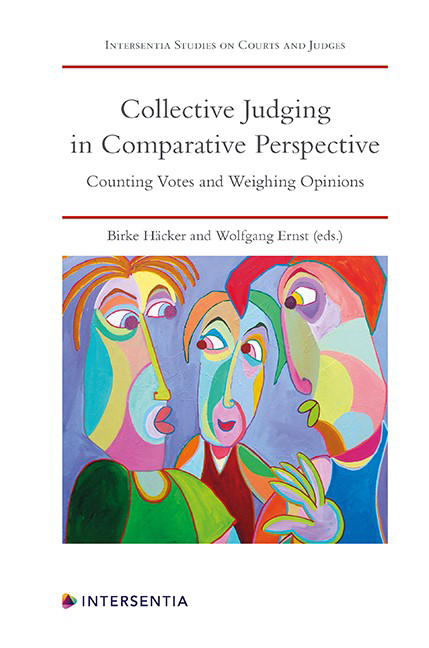Book contents
- Frontmatter
- Preface
- Contents
- List of Cases
- List of Contributors
- PART I DESIGNING COLLEGIATE COURTS’DECISION-MAKING PROCESSES
- PART II COLLEGIATE COURTS IN THE COMMON LAW TRADITION
- PART III COLLEGIATE COURTS IN THE EUROPEAN CIVIL LAW TRADITION
- PART IV COLLEGIATE COURTS IN A NON-EUROPEAN CIVIL LAW JURISDICTION: THE CASE OF JAPAN
- PART V SUPRANATIONAL AND INTERNATIONAL COLLEGIATE COURTS
- PART VI VOICES FROM THE AUDIENCE AND CLOSING REMARKS
- About the Editors
Chapter 9 - Collective Judging at the Swiss Supreme Court
Published online by Cambridge University Press: 09 February 2021
- Frontmatter
- Preface
- Contents
- List of Cases
- List of Contributors
- PART I DESIGNING COLLEGIATE COURTS’DECISION-MAKING PROCESSES
- PART II COLLEGIATE COURTS IN THE COMMON LAW TRADITION
- PART III COLLEGIATE COURTS IN THE EUROPEAN CIVIL LAW TRADITION
- PART IV COLLEGIATE COURTS IN A NON-EUROPEAN CIVIL LAW JURISDICTION: THE CASE OF JAPAN
- PART V SUPRANATIONAL AND INTERNATIONAL COLLEGIATE COURTS
- PART VI VOICES FROM THE AUDIENCE AND CLOSING REMARKS
- About the Editors
Summary
PRELIMINARY REMARKS
Switzerland is a Federal Republic consisting of 26 Cantons. The Cantons are sovereign except to the extent that their sovereignty is limited by the Swiss Federal Constitution.
Apart from a few provisions in the Constitution, the Cantons are free in how they organise their courts and how they regulate court proceedings. Thus, there are 27 different systems in Switzerland – 26 for the Cantons and one for the Federal courts, each with different solutions. The focus of this contribution lies on the rules and regulations applicable to the Swiss Supreme Court (Bundesgericht).
COGNISANCE
It is important to note that the Swiss Supreme Court cannot, in general, establish or revise the facts of a given case. The facts of a case can only be corrected by the Supreme Court if the Court finds that the facts have been incorrectly established by the lower court in a flagrant manner or that the finding of facts was based on a violation of law. Apart from such (rare) corrections of the facts, the Supreme Court only addresses questions of law.
The dispute before the Supreme Court and the legal grounds relevant to deciding the case are primarily defined by the parties. The Supreme Court applies the law ex officio, but only within the grounds of the appeal brought forward by the parties involved.
ORGANISATION OF THE COURT
The organisation and procedure of the Supreme Court are governed by statutory law, namely the Bundesgerichtsgesetz or BGG. The Supreme Court consists of seven Chambers, two dealing with public law, two dealing with civil (private) law, two dealing with social security law and one dealing with criminal law. In addition to 38 ordinary judges serving full-time the Supreme Court has 19 deputy judges. These deputy federal judges serve in a part-time capacity. Their primary occupations are professors, practicing lawyers or cantonal judges. In general, the deputy judges serve as replacements for judges who have recused themselves from a case or have taken sick leave, or when the workload of the Supreme Court becomes overly heavy. In the proceedings in respect of which they sit, the deputy judges have the same rights and obligations as ordinary judges.
- Type
- Chapter
- Information
- Collective Judging in Comparative PerspectiveCounting Votes and Weighing Opinions, pp. 181 - 194Publisher: IntersentiaPrint publication year: 2020
- 1
- Cited by



